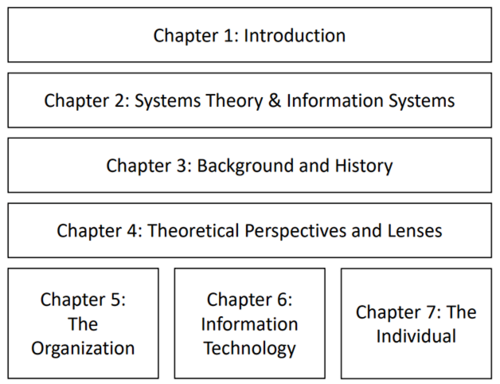Modul 32291 — Socio-Technical Information Systems Design
Socio-Technical Information Systems Design
- Autoren/innen: Julia Krönung, Lukas Florian Bossler, Theresa Wortmann
- Workload: 300 h
- SWS: 6
- ECTS-Punkte: 10
- Dauer: 1 Semester
- Angebot: in jedem Semester
- Prüfung: Klausur (wird in englischer Sprache gestellt und kann in englischer und deutscher Sprache absolviert werden)
Betreuung:
Modulbeschreibung
In this module, we will explore the complex interactions between the multiple social and technical actors in a socio-technical information system. The module is divided into multiple units focusing on the individual parts of a socio-technical information system. Chapter 2 – Systems Theory & Information Systems – introduces basic terminology and defining the important terms for this module. Chapter 3 –Background and History – explains the historical background of the socio-technical approach originating in the Tavistock Institute in Great Britain. Chapter 4 – Theoretical Perspectives and Lenses – explores theoretical perspectives on socio-technical systems. The chapters 5 (The Organization), 6 (Information Technology), and 7 (The Individual) then focus on each of the building blocks of the socio-technical information system, with chapter 5 covering the organization, chapter 6 addressing the technology, and chapter 7 investigating the role of the individual in a socio-technical context.
Inhalt des Moduls
Chapter 1: Introduction
This chapter shows the motivation for socio-technical information systems
Chapter 2: Systems Theory
This chapter covers important basic terminology and shows why it is important to study socio-technical information systems. Through a deep dive into systems theory, the theoretical framework for the following units is set.
Chapter 3: Historical Background
This chapter explains the origins of the socio-technical paradigm. Starting from a purely technical view with Frederick Taylor’s Scientific Management, the negative consequences of a purely technical paradigm are shown with the aftermath of the Second World War. The socio-technical approach as well as its evolution over the following years is explained.
Chapter 4: Theoretical Perspectives and Lenses on Socio-Technical Information Systems
This chapter shows how the socio-technical systems approach in Information Systems relates to various theories.
Chapter 5: The Organization
This chapter investigates how organizations act as socio-technical systems and serve as the surrounding structure to the individuals’ work with socio-technical information systems. It explores the importance of organizational structure and organizational processes.
Chapter 6: Information Technology
This chapter covers the socio-technical design of information technology and information systems. Ingrained in theoretically-based design frameworks, crucial steps in a human-centered design as well as different tools are shown.
Chapter 7: The Individual
This chapter covers perspectives on the individual within socio-technical information systems. Individuals, through their motivations, attitudes, and behaviors impact the successful application and use of socio-technical information systems to a large extent. This chapter covers different psychological factors of the individual that influence information system adoption and use.
Modulstruktur



